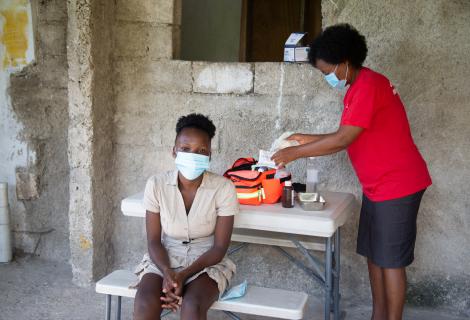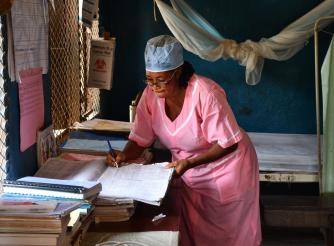World’s largest economies losing up to $32 billion in annual tax revenue from Silicon Valley’s top five tech companies

As G20 leaders meet tomorrow (21 May) for an extraordinary health summit to tackle the pandemic, new research from ActionAid International shows that G20 countries are facing a potential gap of US$32bn in annual tax revenue from just five of the world’s largest tech companies. Just one year’s tax bill from these five companies could have paid for full two-dose Covid vaccination for every human on earth.[1]
Tech giants Amazon, Apple, Facebook, Microsoft and Alphabet Inc have extensive market activity across the world and have racked up billions in profits during the pandemic. If global corporate tax systems were fair, governments could increase their tax revenue and fund better health systems to end the pandemic and start the recovery.[2]
G7 leaders of the world’s richest democracies will meet in June at the first in-person summit since the pandemic began. US President Joe Biden will arrive in the UK having recently supported the need for a global minimum rate of corporate tax, just one idea for tax reform which could address the conundrum of how to fairly tax the digital economy. ActionAid’s new research finds that G7 countries alone are potentially missing out on US$20 billion in tax revenue from just five of Silicon Valley’s tech giants.[3]
- US$32bn for G20 countries.
- US$28bn for the OECD countries.
- US$21bn for G7 countries.
- US$8bn for the EU27.
Tax revenue from tech giants with economic presence in the global south is even more crucial for much needed investment in public services, such as health care and education, which have been decimated by the pandemic.
- Nigeria could raise an additional US$100 million in taxes from these same five companies if taxed fairly, enough to pay the annual salaries of 70,000 nurses.
- Bangladesh could raise a potential US$49.3m in taxes, enough to pay for 12,800 nurses.
Many big tech companies have actively worked to pay as little tax as they can, stretching laws and regulations to their limit to do so. In 2016, the European Commission concluded that Apple had used complicated corporate structures in Ireland to make €110bn worth of sales ‘stateless’ for tax purposes, meaning no country had the right to tax that income. Apple’s effective tax rate in the EU in some years dropped to as low as 0.05% according to the European Commission. Meanwhile, Amazon has reportedly used a web of tax haven companies to minimise their tax liabilities while in 2020 the US tax authorities sued Facebook for US$9bn in unpaid taxes based on the way the company shifted profits around the world to minimise tax bills.
The ongoing Covid-19 crisis has highlighted the need for additional public funds. In fact, our research shows that the potential tax losses in G7 countries could have paid for tens of thousands of additional key public sector workers in those countries.
The pandemic and economic crisis have hit frontline public workers and those with low job security – predominantly women – particularly hard. The temporary or long-term closure of schools in up to 192 countries placed additional care burdens on women around the world, while previous ActionAid research found girls less likely than boys to ever return to school, owing to domestic pressures, child labour, early marriage or early pregnancy.
During the Covid-19 crisis, inequality has also widened, with those profiting from the digital economy drastically increasing their wealth. According to the Forbes’ billionaire list for 2021, the top ten richest people in the world are all men and half of them have made their fortunes primarily from the big tech companies covered by this briefing.
Julia Sánchez, Secretary General of ActionAid International, responding to ActionAid’s new report: ‘Mission Recovery: How Big Tech’s Tax Bill could kickstart a fairer economy’, said:
“People are increasingly outraged at the gross excesses in the global digital economy, which have been exposed as the Covid-19 pandemic exacerbated the deadly inequalities in our economy and health systems. As public services fall apart and the world faces a vaccine apartheid, tech giants and their owners rack up billions in profits because the present global tax system enables them to avoid paying their fair share.
“Women and young people are paying the price for a system that has allowed corporate giants to mine and sell people’s data, insidiously influence our habits and create new billionaires, whilst contributing little or nothing towards public services in the countries where they earn their profits. ActionAid’s new research exposes this injustice and world leaders have the opportunity now to make this right. Taxing tech giants fairly should be a no brainer: US$32 billion a year in lost tax revenue in just 20 countries could go a long way: it’s enough to pay for two vaccine doses for every human on earth.”
ActionAid is one of a number of organisations calling for meaningful reform of international corporate taxation that would ensure companies’ taxes reflect their real economic presence, and for introducing a minimum corporate tax rate to help fight the problem of tax havens. Some companies, like large banks in the EU, are already subject to ‘Public country-by-country reporting’ which involves public disclosure by companies of key financial and tax data, broken down by the countries where they operate. This requirement should be extended to all large multinational companies. Furthermore, countries in the global south should have a meaningful say in setting global tax rules; ActionAid supports the call for the creation of a UN Tax Commission that is empowered and resourced to set and enforce fair tax rules.
ActionAid’s new research shows that billions are at stake in the long overdue reform of international corporate taxation – enough to transform underfunded health and education systems across the globe. In the absence of a global deal on tax, countries must consider unilateral measures to tax these companies on their profits or their transactions.
ENDS.
Notes to Editors
About ActionAid International: ActionAid is a global federation working for a world free from poverty and injustice.
About the vaccine costing: US$32 billion in annual tax revenue from silicon valley’s top five tech companies: Enough to vaccinate every human.
US$32 billion is enough to cover the costs of procuring the vaccine according to data from the World Health Organization (WHO) on the average cost of a Covid-19 vaccination ($1.66 per shot) and the average cost of a 2-shot vaccination course for a person ($3.70 per shot, allowing for administration and wastage). These figures are used to estimate the number of Covid vaccinations and courses of vaccinations that could be purchased with the avoided tax.
This is used to give a sense of the scale of resources involved in taxing big tech companies. In practice, vaccine provision should not need to be financed like this: agreeing a waiver of Trade Related Intellectual Property Rights (TRIPS) would be a much better way to ensure equitable access to vaccines worldwide.
To end the vaccine apartheid crisis, G7 leaders must agree a ‘vaccines for all global roadmap’. The poorest citizens and countries must have the same rights and access to immunisation as the richest so that we reach at least 60% of people worldwide by the end of 2021 and a vaccine for all who need one by the end of 2022. The G7 must pay their fair share of the burden, covering at least 60% of the global costs of delivering a people’s vaccine; and finalise a temporary waiver of patents as soon as possible to drive down the cost and scale up production in all continents as part of an emergency plan for universal coverage.
Calculating the “Tax Gap”
In this section we will outline how we calculated the potential tax gap owed by tech giants if they were being tax fairly at a global level and provide an outline of the underlying assumptions. Let us first be clear about the fact that these are potential tax losses, rather than actual tax losses. That does not mean that the numbers are either an overestimation or an underestimation of the actual figures, it just means that we have used the best publicly available data and made reasonable assumptions about the companies’ economic presence in different jurisdictions. The best way for companies to give their account of their tax contributions in the various countries where they operate is to publish public country-by-country reports. Such reports – which detail sales, number of staff, revenues, taxes paid, assets etc in different jurisdictions - are already filed confidentially with tax authorities.
Data sources
- We used each company’s 10k[4] report for 2020 (filed with the US Securities and Exchange Commission and available online) to get data on global profits.
- We then apportioned profits to each country according to the number of technology users in each country,[5] scaled by GDP per capita relative to the global average.[6]
- Because Facebook and Google are blocked in China, we assumed that revenue there were zero. A similar assumption was made for Amazon as it does not sell directly to customers there.
Calculating corporate tax avoided in each country
To calculate the amount of tax that is potentially avoided in each country we used a two-stage calculation:
Step 1: We took the headline corporate tax rate in each country
Step 2: to estimate the effective tax rate in each country we used data from the US Internal Revenue Service on the actual rate of tax paid by multinational corporations in the information sector in the US compared to the headline (federal+state+local) corporate tax rate in the US (https://www.irs.gov/statistics/soi-tax-stats-country-by-country-report). The IRS statistics show that the effective tax rate is on average 83% of the headline rate. The headline tax rate for each country in this study is multiplied by a factor of 0.83, on the assumption that the relationship between headline and effective tax rates for multinationals will be similar (on average) in the countries featured in the study to the pattern that exists in the US.
The final formula for calculating potential tax losses is therefore:
Apportioned profits[7] x Headline corporate tax rate x 0.83
We have then assumed that the companies analysed do not currently pay any corporate income tax. As none of the companies provide any public country-by-country breakdown of current corporate tax payments it is impossible to know for sure what their tax liabilities are in any of the featured countries. They are however likely to pay some corporation tax in some jurisdictions which is why we make it clear that these are potential rather than actual tax losses.
Because of the lack of public country-by-country reporting by these companies, we refer to the findings of our calculations as potential tax losses rather than actual tax losses. To help us improve the calculations, the big tech companies analysed in this report can publish country-by-country breakdown of their tax payments, revenue, sales, number of staff etc.
Estimating the number of Covid vaccinations and courses that could be funded with the avoided tax
This analysis uses data from the World Health Organization (WHO) on the average cost of a Covid-19 vaccination (US$1.66 per shot) and the average cost of a 2-shot vaccination course for a person (US$3.70 per shot, allowing for administration and wastage). These figures are used to estimate the number of Covid vaccinations and courses of vaccinations that could be purchased with the avoided tax.
Estimating the number of public service workers that could be funded with the avoided tax
Data from the OECD statistical database (https://stats.oecd.org/index.aspx?queryid=30025#) was used to provide salary information for key public service workers (hospital nurses and primary school teachers) in OECD countries. The OECD has complete data on teachers’ starting salaries for OECD countries but the data on nurses’ salaries is missing for some countries (Belgium, Chile, Korea and Sweden). For G20 countries outside the OECD, the only salary information available from the OECD database was for teachers in Brazil.
The number of public service workers that could be funded with the avoided tax for each country was then calculated straightforwardly as “total potential avoided tax / salary”.
Footnotes
[1] $32 billion would only cover vaccine doses only, not the full costs of the vaccine rollout. This figure merely offers a sense of the scale of resources involved in taxing big tech companies. In practice, it is by sharing knowledge and technology that the production of vaccines can be accelerated to reach as many people as possible. One route is through a temporary waiver of patents on vaccines (and other Covid-19 therapeutics and diagnostics), as championed by India and South Africa and the more than 100 countries at the World Trade Organisation. The Biden Administration has recently backed the waiver of patents on vaccines, and we urge the UK Government as G7 hosts to follow suit.
[2] ‘Fair tax’ means companies paying tax where they operate, reflecting their real economic activity, which can only be possible if companies are required to publish how much tax they have paid and the amount of profit they have made in each country.
[3] Little is known about how much these companies are currently paying in tax, as they are still not required to publicly disclose this information. This research shows, however, that billions could be at stake in the long overdue reform of international corporate taxation and how this could transform health and education systems.
[4] A 10-K is a comprehensive report filed annually by public companies about their financial performance. The report is required by the U.S. Securities and Exchange Commission (SEC) and is far more detailed than the annual report. Information in the 10-K includes corporate history, financial statements, earnings per share, and any other relevant data.
[5] Alphabet: number of internet users (using internet use as a proxy for Google search use). As a check I also used number of people with Android smartphones as an alternative user base given that Alphabet owns Android – this produced very similar results to using the number of internet users as the user base.
Facebook: number of Facebook users
Microsoft: number of people accessing the internet using desktop computers (as a proxy for Microsoft Windows/Office use)
Apple: number of people with iOS smartphones
Amazon: total value of consumer ecommerce market in each country (as a proxy for Amazon sales in each country).
[6] Users are a key indicator of sales for big tech companies and indeed user data is probably the most valuable asset for these companies – that they can use in a multitude of ways. Normally, we would argue for apportioning profits based on a wider range of factors including sales, assets and employment. For big tech companies it makes sense to follow a different approach as they have very few employees relative to their profits and users are a fair starting point for determining sales and assets. Indeed, we believe that users are a reasonable proxy for economic presence which we can use for companies of this type in the absence of publicly available data on profits, taxes paid and other key information from country-by-country reporting by these companies. However, we stop short of suggesting that user numbers or sales should be the sole basis for design of actual taxes, as any apportionment formula should consider other factors, ensuring a fair allocation of profits. Our research only aims to illustrate the scale of potential tax revenue that is at stake, if companies’ tax bills better reflected their genuine economic presence.
[7] Based on taking total global profits and apportioning it by country based on the number of technology users in a country scaled by GDP per capita relative to the global average.
Key tables from ActionAid’s new report: ‘Mission Recovery: How Big Tech’s Tax Bill could kickstart a fairer economy’
Potential tax losses from 5 of the world’s largest Tech companies:
|
Groups of countries |
|
|
G20 countries |
US$31.99bn |
|
OECD countries |
US$27.97bn |
|
G7 countries |
|
|
EU27 |
US$7.92bn |
|
Other major economies |
|
|
India |
US$1.54bn |
|
Brazil |
US$1.57bn |
|
China |
US$2.33bn |
|
Russia |
US$838m |
|
Indonesia |
US$810m |
In terms of individual companies, the potential tax losses are:
|
Company |
G20 |
G7 |
OECD |
The EU |
|
Alphabet |
US$6.47bn |
US$4.11bn |
US$5.70bn |
US$1.81bn |
|
Amazon |
US$2.12bn |
US$1.61bn |
US$2.10bn |
US$0.52bn |
|
Apple |
US$8.38bn |
US$6.28bn |
US$7.59bn |
US$1.54bn |
|
|
US$5.19bn |
US$3.26bn |
US$4.81bn |
US$1.45bn |
|
Microsoft |
US$9.83bn |
US$5.51bn |
US$7.77bn |
US$2.60bn |
Equivalent to public sector wages:
|
Country |
Potential losses from 5 big tech companies |
Number of annual nurse salaries this could have paid for |
|
Bangladesh |
US$49.3m |
12,872 |
|
Ghana |
US$13.6m |
3,990 |
|
Kenya |
US$18.5m |
4,247 |
|
Nigeria |
US$103.2m |
70,491 |
|
Senegal |
US$5.8m |
1,165 |
|
Tanzania |
US$7.2m |
1,527 |
|
Zambia |
US$3.5m |
1,066 |
|
Zimbabwe |
US$2.4m |
2,041 |

